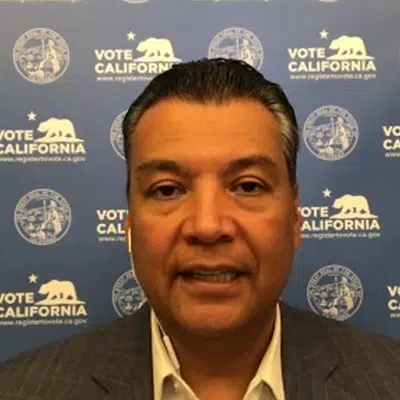On July 16, PRIDE CEO Jeff Dern had the opportunity to interview California’s Secretary of State, Alex Padilla, about voting in California. In a wide-ranging conversation, they explored issues of voter accessibility, the importance of having a voice in government, and how to vote safely in the era of COVID-19. Their talk, edited for brevity and clarity, follows below.
DERN: Welcome, Secretary of State Alex Padilla. I’m so pleased to be able to speak with you today. As you may know, PRIDE Industries is the nation’s leading nonprofit employer of people with disabilities. And as the company’s CEO, accessibility issues are very important to me. That’s why I’m excited to hear what you have to say in regards to voting. Thank you for joining me today, sir.
PADILLA: Thank you for the opportunity to have this important conversation. The November 2020 election will be here before we know it, and there’s a lot at stake.
DERN: I agree. So let’s begin: As California’s Secretary of State, you’re the state’s chief elections officer. You oversee the Voting Accessibility Advisory Committee, which aims to ensure that all Californians can vote. Since we’re celebrating the 30th anniversary of the Americans with Disabilities Act (ADA) this month, it seems fitting to start our conversation by asking you about voter accessibility in the state of California.
So my first question is: Why is voting so important to all Californians, including people with disabilities?
PADILLA: I think a great example of why voting is so important is the ADA itself. Its passage 30 years ago is a prime example of how our votes matter. Our political voice matters. Because it doesn’t just determine who our representatives are at all levels of government, but also what their priorities are, and—by extension–what policy actions they choose to take.
Those folks who fought for disability rights over 30 years ago, whose work led to the passage of the ADA, they knew that political action was required not just on Capitol Hill, but in election after election. They knew they had to create an environment that would enable legislation like the ADA.
It’s as simple as recalling our high school government class, when we’re taught that our democracy works best when as many eligible people as possible choose to participate. To be eligible to vote, you need to be at least 18 years old and a citizen of the United States. Period. This means voters of all abilities have the right to vote. And I believe we all have a civic responsibility to register and make our voices heard in the political process. Again, our participation determines not just who our representatives are, but by extension, their policy priorities in Congress and statehouses and at the county, city, and even school-board level.
My job as Secretary of State is to ensure that our elections in California are as accessible as possible—both on the voter registration side and on the voting side, with multiple options for how to cast your ballot in every election.
DERN: That’s wonderful to hear. So now, let’s talk about practical issues. The fact is, people with disabilities face obstacles to getting out, registering, and voting. What can the state of California do to assist with this process?
PADILLA: As in many states, California citizens have a range of different abilities. California is also the most populous and diverse state in the nation. That’s why we provide multiple ways for our citizens to register and vote, so that we can accommodate a variety of abilities and needs.
If you prefer to register to vote on a paper form, you have that option in multiple languages, including braille. Or, if you prefer to register online, you can do that. In addition, people can register to vote or update their voter registration record at the Department of Motor Vehicles (DMV). So when they’re at the DMV applying for or renewing their driver’s license or their state ID, they can handle their voter registration needs at the same time. And now, our citizens have the option of same-day registration in the days leading up to Election Day, and even on Election Day itself.
When it comes to actually casting a ballot in California, we’ve been on the forefront of expanding voting options for all eligible citizens. We start by ensuring that voting locations are accessible in every sense of the word. Physical accessibility is paramount, in addition to geographic accessibility. Voting locations must be close to public transit, for example. Many counties are also increasing the number of days on which you can vote, and my advice is: If you can vote early, do so.
The vote by mail option certainly helps accessibility, and more and more people are choosing that option. California’s officials have recognized the popularity, convenience, and safety of voting from home, so we’ve pioneered some of the first remote accessible vote by mail systems in the country. Whatever your abilities, we’ve tried to ensure that there’s an option that allows you to exercise your right to vote. And I encourage everyone to use that right.
DERN: I second that advice. It’s incredible to see how many options are available to make voting and registration accessible to everyone. I can’t help but recognize, however, that this year we have a new issue that complicates accessibility—the pandemic. So I have to ask: Given the environment we’re in today with COVID-19, what specific plans does the the state have to address voter turnout and accessibility?
PADILLA: That’s an important conversation that we’ve been having at the capitol. Because it’s not a matter of if there’s going to be a general election. It’s not a matter of when there might be a general election. We’re not going to cancel it. And we’re not going to reschedule it, no matter what may be happening statewide or nationwide. Election Day is Tuesday, November 3, and we’re working hard to ensure that it is accessible, that it is secure, and that it is safe for everybody involved—for voters and election workers alike.
That’s why we’ll be sending ballots to every registered voter in advance of the November general election; and we’re encouraging people who can vote from home to do that. There’s no safer or more convenient way to vote than from the comfort of your own home. But as I mentioned earlier, California is the largest and most diverse state in the nation, and we have a lot of people who either prefer—or frankly need—an in-person voting option. They may need to replace a lost ballot, or perhaps they made a mistake filling it out. Or maybe they need to register and missed the deadline.
There are many valid reasons to choose in-person voting. That’s why we’re working hard to ensure that there are many safe, accessible, in-person voting opportunities, both on and before Election Day. So while my first recommendation is to vote by mail if you can, my second piece of advice is that if you prefer to vote in person, consider voting early. Because the more Californians who vote early, whether it’s by mail or in person, the shorter the lines will be and the smaller the crowds, which will help ensure a safe experience on Election Day.
DERN: In speaking with you today, it’s clear how much thought and energy has gone into making voting more accessible here in California. PRIDE Industries encourages all of its employees to take advantage of this accessibility, and to get out and register to vote on or before Election Day. As you mentioned earlier, the anniversary of the ADA reminds us how exercising voting rights can lead to significant change in our country. Again, Secretary Padilla, thank you for taking the time to share your insights on this important issue. It’s been an honor to speak with you today.
PADILLA: Thank you for letting me talk about something so important to all of us. Let me just end with this final piece of information: If anybody has questions about what we’ve talked about today, please visit us at vote.ca.gov.
DERN: And once again, folks: However you do it, make sure to vote.



PRIDE Industries is a social enterprise delivering business excellence to public and private organizations nationwide.
